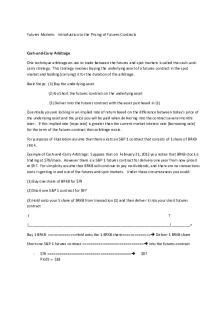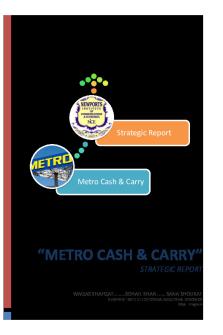Futures Markets Cash and Carry Arbitrage Note PDF

| Title | Futures Markets Cash and Carry Arbitrage Note |
|---|---|
| Author | Luche' Gomes Balanco |
| Course | Market Risk |
| Institution | University of South Africa |
| Pages | 3 |
| File Size | 74.4 KB |
| File Type | |
| Total Downloads | 91 |
| Total Views | 119 |
Summary
Futures Markets Cash and Carry Arbitrage Note...
Description
Futures Markets: Introduction to the Pricing of Futures Contracts
Cash-and-Carry Arbitrage One technique arbitrageurs use to trade between the futures and spot markets is called the cash- andcarry strategy. This strategy involves buying the underlying asset of a futures contract in the spot market and holding [carrying] it for the duration of the arbitrage. Basic Steps: (1) Buy the underlying asset (2) Go Short the futures contract on the underlying asset (3) Deliver into the futures contract with the asset purchased in (1) Essentially you are locking in an implied rate of return based on the difference between today’s price of the underlying asset and the price you will be paid when delivering into the contract several months later. If this implied rate [repo rate] is greater than the current market interest rate [borrowing rate] for the term of the futures contract then arbitrage exists. For purposes of illustration assume that there exists an S&P 1 contract that consists of 1 share of BRKB stock. Example of Cash-and-Carry Arbitrage: Suppose that on February 21, 2012 you notice that BRKB stock is trading at $79/share. However there is a S&P 1 futures contract for delivery one year from now priced at $97. For simplicity assume that BRKB will continue to pay no dividends, and there are no transactions costs in getting in and out of the futures and spot markets. Under these circumstances you could: (1) Buy one share of BRKB for $79 (2) Short one S&P 1 contract for $97 (3) Hold onto your 1 share of BRKB from transaction (1) and then deliver it into your short futures contract t
T
|_____________________________________________________________________|_________> Buy 1 BRKB ==============Hold onto the 1 BRKB share============== Deliver 1 BRKB share Short one S&P 1 futures contract ============================== into the futures contract -
$79 ========================================= Profit = $18
$97
Rate of Return on the Cash and Carry = $18/$79 = .22785 or 23% [implied repo rate]
If you are using a clearing corporation to back up fulfillment of this trade and there is virtually no risk of default, then you earn what is the equivalent of a T-bill [or discounted paper return]. This type of cash and carry investment is called a synthetic T-Bill because its cash flows mirror that of a T-Bill. You have essentially made a synthetic loan because you have lent money at $79 in order to receive a future payment one year from now of $97. Now, suppose you can borrow money to initially buy the one share of BRKB at a rate of 5%. Under these circumstances, your cash and carry synthetic lending rate is 23% against a borrowing rate to do the trade of 5%. Your riskless profit will be 23% - 5% or 18% which is sometimes referred to as a pure arbitrage play. So, whenever the Cost to carry Synthetic Loan Rate > Cost of Borrowing A cost to carry pure arbitrage opportunity will exist. Note though that the very existence of this arbitrage play will set in motion market forces to reduce your arbitrage profit. Buying shares of BRKB will cause prices to rise from $79. Selling the S&P 1 futures contract will cause the price of the contract to decline from $97. At some point the price of BRKB shares may be 80 and the S&P 1 for future delivery may adjust to $84. and when that happens the cash and carry rate of return will be:
[$84. - $80]/$80 = .05 or 5% at which time there will be no arbitrage possibility, since your borrowing rate equals the synthetic loan rate.
Some Terminology: The rate of return on a cash and carry arbitrage transaction is referred to as the implied repo rate. To determine whether anything is to be gained from an arbitrage play, you need to have the implied repo rate > cost of borrowing.
Reverse Cash- and- Carry Arbitrage A reverse cash-and-carry arbitrage is the exact opposite to a cash-and –carry transaction. Instead of buying the underlying security because it is underpriced, you sell it short [because it is overpriced], take the proceeds and go long a futures position on the underlying security. Before the futures position expires you close out the position by taking delivery and returning the borrowed shares you were short....
Similar Free PDFs

METRO Cash carry case
- 31 Pages

Cash and Cash equivalents
- 21 Pages

Cash and Cash equivalents
- 5 Pages

CASH AND CASH Equivalents
- 4 Pages

Cash and Cash Equivalent
- 2 Pages

Week 5 Futures and options
- 13 Pages

CASH-AND-CASH- Equivalents- mft
- 4 Pages

Pricing Forwards and Futures
- 45 Pages

Cash and cash equivalents testbank
- 12 Pages

FEU Cash-and-Cash-Equivalents
- 7 Pages

2. Cash and Cash Equivalents
- 3 Pages
Popular Institutions
- Tinajero National High School - Annex
- Politeknik Caltex Riau
- Yokohama City University
- SGT University
- University of Al-Qadisiyah
- Divine Word College of Vigan
- Techniek College Rotterdam
- Universidade de Santiago
- Universiti Teknologi MARA Cawangan Johor Kampus Pasir Gudang
- Poltekkes Kemenkes Yogyakarta
- Baguio City National High School
- Colegio san marcos
- preparatoria uno
- Centro de Bachillerato Tecnológico Industrial y de Servicios No. 107
- Dalian Maritime University
- Quang Trung Secondary School
- Colegio Tecnológico en Informática
- Corporación Regional de Educación Superior
- Grupo CEDVA
- Dar Al Uloom University
- Centro de Estudios Preuniversitarios de la Universidad Nacional de Ingeniería
- 上智大学
- Aakash International School, Nuna Majara
- San Felipe Neri Catholic School
- Kang Chiao International School - New Taipei City
- Misamis Occidental National High School
- Institución Educativa Escuela Normal Juan Ladrilleros
- Kolehiyo ng Pantukan
- Batanes State College
- Instituto Continental
- Sekolah Menengah Kejuruan Kesehatan Kaltara (Tarakan)
- Colegio de La Inmaculada Concepcion - Cebu




